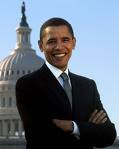When a novel by an unknown Christian writer which is basically privately published, goes to the top of the NY Times fiction bestseller list, mostly on the basis of word of mouth, you know something is up. More particularly you know it seems to be a God thing, since word of mouth doesn’t really travel that far that fast from say the woods outside of
I want to say from the outset that I thoroughly enjoyed reading this novel, as it involves a lot of interesting theologizing about God and the divine-human encounter, and it clearly has struck a nerve with many people who are longing to have a close encounter with God of the first sort. I am happy this novel can provoke thought and stir up people to reconsider the God of the Bible and what having a relationship with God might mean and be like. And because it is a work of fiction, no one should evaluate this work as if it were an exercise in systematic theology as if it were Barth’s Dogmatics for the
One of things that is up is we are in a post-modern situation and this makes people in some cases more open to things spiritual, but paradoxically less open to traditional church and religion in general (if I see one more bumper sticker saying ‘I believe in Jesus, not Christianity’, or ‘I believe in Jesus, not religion/church etc.’ I think I will be forced to honk). This novel most certainly breathes that ‘Jesus without traditional religion air’. For example, late in the novel Jesus says to the main character in the novel Mackenzie Phillips who is turned off by traditional church “that’s because you’re only seeing the institution, a man-made system. That’s not what I came to build. What I see are people and their lives, a living breathing community of all those who love me, not buildings and programs…Not a bunch of exhausting work and long list of demands, and not sitting in endless meetings staring at the back of people’s heads…just sharing life†(pp. 179-80). It’s all about relationships, and not about religion, according to this approach. And while no one would deny it’s very much about living and loving relationships, the truth of the matter is that it is a false dichotomy to separate Jesus from religion, or for that matter organism from organization. Let me give an illustration on the latter point.
Consider for example a very simple organism indeed—the single cell amoeba a form of protozoa. Now the amoeba is nothing if not flexible. It can subdivide over and over again. But within that larger flexible entity there is organization—there is a nucleus for example, without which it could not exist. It also has pseudo-pods by which it moves and vacuoles by which it maintains its equilibrium. Without structure, order and organization it could not ever be even a viable living thing. This is in fact true of all organisms, and that includes the church, if one wants to call it an organism. That doesn’t mean that human beings aren’t capable of over-institutionalzing things, or ossifying some of the structures, but to pit organism over against organization, with one seen as living and the other dead, one God-given, and the other man-made is absolutely a false dichotomy when it comes to the church.
There is no such thing in heaven or on earth as an organism without organization, order, structure, form, otherwise it would have no distinct shape, purpose, or being. And that applies to God, the church, as well as to all created things—remember the story of how God created the universe in a very specific order with very specific properties? Well it’s always been like that. Creativity takes a particular form and shape, bring order out of chaos or a disparate group of elements. Spontaneity is not particularly more God-like than something that was planned before the foundations of the world and executed over a long period of time. And why we should think an organism like the church needs to normally be completely spontaneous in order to be ‘alive’ is a mystery. Perhaps it is an over-reaction to spending too much time in moribund or unwell churches. One thing I know about real works of art— they take time to create, and care, and skill, and form, and substance. This is as true of a Matisse masterpiece as of God’s creation of the universe. But I digress.
Another element in the creative theologizing in this book is what is said about the Trinity. Another of the bad guys in this novel is ‘hierarchy’ whether in human relationships or in the Godhead. Consider what is said on p. 122—“Once you have a hierarchy you need rules to protect and administer it, and then you need law and enforcement of rules, and you end up with some kind of chain of command or a system of order that destroys relationship rather than promoting it. You rarely see or experience relationship apart from power. Hierarchy imposes laws and rules and you end up missing the wonder of relationship†Or on the immediately previous page ‘Papa’ (aka God the Father) tells Mack “We [i.e. the Trinity] are in a circle of relationship, not a chain of command. What you are seeing here is relationship without any overlay of power…Hierarchy would make no sense among us. Actually this is your problem, not ours.â€
There are some real problems with this sort of formulation, especially when one comes to deal with the fact that the Son is the only begotten of the Father, and only the Son dies on the cross, and no one comes to the Father except through the Son, and no one receives the Spirit except if the Father and Son sends the Spirit. Even in the most revealing of Gospels when it comes to the relationship between Father and Son, the Fourth Gospel, we have a very clear picture of a functional subordination of the Son to the Father—he can only do and say what his Father gives him to do and to say, even though he is fully equal in being to the Father and can be called God in John 1 and 20 (see my study The Shadow of the Almighty). In other words, hierarchy and subordination are not inherently the enemies of equality of being. There is a reason why the church Fathers suggested a triangle rather than a circle best images the Trinity—it has a certain order and shape, just as the relationships within the Trinity do. The image of God in this novel is even pushed so far as to say that following “When we three spoke ourself into human existence as the Son of God, we became fully human. We also chose to embrace all the limitations that this entailed.†(p. 98). This statement is closer to Monarchianism, a heresy the early church rightly condemned than it is to Biblical Christianity.
The Father and the Spirit did not become incarnate as the Son did, and did not assume the limitations the Son did at the point of the Incarnation. Only the Son took on flesh. The three-ness of God must be stressed just as much as the oneness of being or ‘ousia’ of God, and in that three-ness there are things that can be said of the Son that cannot be said of Father or Spirit (for example the Father is unbegotten from all eternity, the Son alone died on the cross, and the Spirit did not become Incarnate with or as Jesus). Equally problematic is the comment on p. 100—“I am one God and I am three persons, and each of the three is fully and entirely the one.†This for sure is not what the ecumenical councils said about the relationship of Father, Son and Spirit. They said that the three persons of God shared the divine nature or ousia, not that each of the 3 are fully and entirely the one (go back and read up on monarchianism, monothelitism, Sabellianism, and Apollonarianism).
Equality in the Godhead no more means ‘the same’ in all respects, functions, or activities any more than it need mean that in human relationships. If there is a place for subordination and obedience within the Trinity, there is a place for it in human relationships. And furthermore, obedience is not at odds with love— indeed we are commanded to love in the Bible, and thus the two are rightly spoken of in the same breath—as Jesus says “if you love me, you will keep my commandmentsâ€. Law, order, rule, commandments are not inherently the source of the human problem in the Bible, sin is—which not incidentally begins as an act of disobedience to a specific commandment.
While I certainly agree that some forms of hierarchy can be oppressive, for example a gender specific hierarchy which resulted from the fall when ‘to love and to cherish’ became ‘to desire and to dominate’, the Bible is quite clear that ordering of relationships is a normal and good thing. It is not an accident that children are commandment to obey their parents in various places in the OT (see Proverbs) and the NT (see Paul’s letters). Obedience is the quite concrete shape love can and often should take. But what about the idea of freedom in this book— both the freedom of God, and the free will of human beings?
I suspect that Calvinists will have even more problems with what is said about freedom in this book than I would, but I too have various serious issues with what is said about freedom in this novel. Let us consider first what is said about human freedom on p. 93: “Does freedom mean that you are allowed to do whatever you want to do? Or we could talk about all the limiting influences in your life that actively work against your freedom. Your family genetic heritage, your specific DNA, your metabolic uniqueness, the quantum stuff that is going on at the subatomic level…Or the intrusion of your soul’s sickeness that inhibits and binds you, or the social influences around you, or the habits that have created synaptic bonds and pathways in your brain. And then there is advertising, propaganda, and paradigms. Inside the confluence of multifaceted inhibitors….what is freedom really?†This is actually one of the best and most interesting passages on freedom in this novel where God reflects on human freedom, and it is precisely these sort of factors that lead to assumptions about materialistic determinism, or biology is destiny and so on. At the very least these factors are inhibitors or limiters of human freedom to some degree. And I would emphasize that human falleness is the biggest inhibitor of all. Apart from the grace of God, human beings are not able not to sin. Apart from God’s grace, we are all in the bondage to sin. The question becomes, does God’s grace work outside of and before we have a personal relationship with God? Fortunately the answer to this is yes, or else none of us would ever repent or have a personal relationship with God at all.
One of the major flash points in the discussion of freedom and the reason for an insistence on it is of course that love is not something that can be forced, compelled, compulsed, pre-determined etc. To have a loving relationship with someone requires a modicum of freedom of choice, at a minimum, and the power of contrary choice. I have stressed this elsewhere in this blog, so I will not belabor the point here, but Young is basically right on this point. But how far and to what degree does this characterize the way God relates to us. At one point Jesus in the novel says “To force my will on you…is exactly what love does not do. Genuine relationships are marked by submission even when your choices are not helpful and healthy.†(p. 146). The concept is then broached about how God has submitted himself to our human choices in various ways. The problem with this is it eliminates part of the Biblical paradox. The Bible is all about divine intervention. God is always intruding into our affairs, like a good parent should when his children are as wayward as we are. Is it really the case that God never rescues us against our will? Does God stand idly by, when a normal human parent would leap in and grab the child about to step out onto a highway and be smashed by a sixteen wheeler? Or listen to the following passage on p. 188. God says:
“Just because I work incredible good out of unspeakable tragedies doesn’t mean I orchestrate the tragedies. Don’t ever assume that my using something means I caused it or that I need it to accomplish my purposes. That will only lead to false notions about me. Grace doesn’t depend on suffering to exist, but where there is suffering you will find grace in many facets and colors.†And then God adds “my love is a lot bigger than your stupidity…I used your choices to work perfectly into my purposes.†(p. 192). Now it is clear enough that Young is not an universalist in the sense that he thinks all will ultimately respond positively to God’s will. But when you once allow that God is busy working all things together for good for those who love Him, whether they realize it or not, then it becomes perfectly clear, as also in cases like when God flattened Paul on the road to Damascus that there are times when God doesn’t wait on our permission to do things on our behalf, and in various cases does things that would have been against our wills at the time. And herein lies the mystery—God, by grace both gives humans limited freedom, but is prepared to intervene and make corrections, redirections etc. for God is free as well, and there is something more important than human beings ‘having it their independent way’ and that is rescuing them. A drowning person can’t save themselves, they require a radical rescue—but how they respond to that rescue thereafter, whether in loving gratitude or with a bad attitude—well that’s another matter and involves human volition.
In other words, the answer to the question of why tragedy happens in the world is not just because God won’t violate our wills, or just because our wills are bent and fallen, and we are the orchestrators of our own tragedies. It’s far more complicated than that. If God’s relationship with us is at all like a relationship between a good parent and petulant child, then yes there are times when the human will is and must be violated to rescue the child from disaster. Thank goodness my parents cared enough about me to do that on occasion. On most occasions loving and leading and modeling was enough. On some occasions it was not.
The God of the Bible is not just a wistful wooer of fallen humankind. The God of the Bible is an intervener and a Lord over all. And while we are at it—the Jesus of the Bible is not Mr. Rogers— he said he was coming back to judge the quick and the dead, as the Book of Revelation makes so very evident. Nor is the Holy Spirit just the one who gives us holy goosebumps, the Spirit is the Spirit of holiness and a refiner’s fire of sanctifying influence.
In other words, the God of the Bible is both a God of justice and mercy, of righteousness and compassion, of love and lordship, of order and creativity, of hierarchy and equality. Unless you can hold these antinomies in tension, you cannot paint a full picture of the Biblical God.
I am thankful for this novel, and its strong stress on the relational and deeply personal nature of our God. I am equally thankful for the message that God is much greater than we could ever think or imagine. I like as well the emphasis on love and freedom, rightly understood, as well as its admission that not all roads lead to God, for Jesus is the way. But on its next lap around the revising track, and before it goes into somebody’s movie, it needs to make a pit stop for some more theological tune ups.


